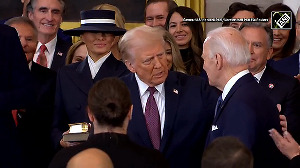Without strategising together, Jayalalithaa’s successor, Chief Minister Edappadi K Palaniswami, and M Karunanidhi’s son-cum-successor, M K Stalin, have used tough-talking on seat-sharing with allies, to replace charisma that they purportedly lacked, during the run-up to the assembly polls scheduled for April 6, says N Sathiya Moorthy.

All those who had thought of Tamil Nadu without Amma (J Jayalalithaa) and Thalaivar (M Karunanidhi), and had also strategised to take over ‘Dravidian’ Tamil Nadu effortlessly, now have their answer.
Without strategising together, Amma’s present-day successor, Chief Minister Edappadi K Palaniswami (EPS), and M Karunanidhi’s son-cum-successor, M K Stalin (MKS), have used tough-talking on seat-sharing with allies, to replace charisma that they purportedly lacked, during the run-up to the assembly polls scheduled for April 6.
Together, EPS and MKS have shown to the outside world anticipating an imminent collapse of the Dravidian polity from the very day Jayalalithaa was hospitalised after victory in the 2016 assembly polls, that there is more to it than charisma or a filmi past that their bosses up to the previous generation possessed and electorally exploited. \
There is hard work, policy initiatives and grassroots-level connect through second-line intermediaries that have contributed to the stability of the current leaderships in these two parties that are otherwise shorn of any filmi connection in the strict sense of the term.
In doing so, EPS may have created a new admirers group of his own, especially from among those that had seen him as being servile to Jayalalithaa in her time, to the latter’s live-in confidante V K Sasikala for a time, and to the ruling Bharatiya Janata Party leadership at the Centre, ever since.
For his part, Stalin, who is also the senior-most Tamil Nadu politician at the helm of any political party in the state, has sent out an unspoken message to adversaries from within, that he is the DMK boss, and he is also the boss of the alliance that his party leads.
That way, both the Dravidian bosses talked tough especially with their national allies -- and are seen as having had their way. EPS in particular is seen as putting the Big Two in the BJP in their place as far as state politics is concerned.
If undenied media reports and speculation are to be considered, EPS firmly, yet quietly, stood his ground on the BJP’s desire/demand/pressure for the All India Anna Dravida Munnetra Kazhagam to do electoral business with estranged Sasikala faction in some form or the other.
To cap it all, EPS has also thrown out the Desiya Murpokku Dravida Kazhagam ally of actor-politician Vijayakanth over seat-sharing arrangements, and without batting an eyelid. In her time, Jaya had to woo Vijaykanth in elections 2011 for her to come back to power. But she also did in her DMDK legislature group, the largest after her AIADMK. It was in the same way she neutralised the Congress ally in and from elections 1991, when the ‘Rajiv Gandhi assassination’ had catapulted her to power for the first time.
Interestingly, EPS chose a Delhi visit, that too after a meeting with Prime Minister Narendra Modi, to declare that there was no place for Sasikala or the Amma Makkal Munnetra Kazhagam identified with her. In standing tough, it is felt, he also ensured that she announced her decision to ‘stay away’ from elections 2021.
EPS also scored over the BJP on seat-sharing. Early on, state BJP chief L Murugan was trumpeting the party’s claims to 60 seats in a total of 234, arguing that they could win as many seats on their own steam. It was laughable as in the past the BJP’s vote-share on its own steam was lower than the NOTA votes.
But when the party stuck to that figure or reportedly close to the same, not only AIADMK leaders but also independent election observers in the state were aghast. Now, the BJP has settled for just 20 seats, that too after sending team after team of central leaders on their negotiations team.
Prime Minister Modi spent time with EPS at the conclusion of an official function. Union Home Minister Amit Shah reportedly spent a couple of hours with EPS and Deputy Chief Minister O Pannerselvam, or OPS -- but neither to any avail.
EPS’s assertiveness had stood him in good ground vis a vis OPS, over the former’s desire to be named as the AIADMK’s sole chief ministerial nominee. OPS had to swallow his perceived threats, and gave in easily after pretentions of a protest that was not. Even the BJP’s assertion that they would chose the chief minister, post-poll, claiming that it was a National Democratic Alliance affair and not an AIADMK exclusive, did not materialise.
EPS has had his way one more time -- all of it in a matter of months, preceding which he was seen as crawling when he was not expected to even bend. The question is if the AIADMK can try to capitalise on this obvious political victory of EPS, to the pan-Tamil sections of non-committed voters, that too with the BJP on the one hand and OPS on the other, present in the very same alliance.
If someone thought that Team EPS will wait until after striking the seta-sharing deal with the BJP that had a huge claim, he pulled a fast one on them. Without hesitation, he passed off the BJP for a time, and struck a 23-seat deal with the Pattali Makkal Katchi, which has the third largest proven vote-share of 5.5 per cent over the past three decades.
He has since called the bluff of actor-politician Vijayakanth’s DMDK, which was still living in the 2009 LS poll past, when the party scored over 10 per cent vote-share, up from eight per cent in the maiden 2006 assembly elections.
Not happy with the fewer seats offered now, the DMDK has decided to contest alone. They have decided to contest all 234 seats – at least, that is the current claim. It is anybody’s guess how the party would perform, as founder Vijaykanth has been sick for the past year, and has not stirred out of his home to be able to campaign for the party candidates in the scorching sun, that too in the midst of the pandemic threat.
The AIADMK has offloaded some of the allies that won seats on the party symbol in 2016. They offered unilateral support to the DMK rival, but withdrew the same within 24 hours as the latter was in no mood to spare seats for late entrants. Sure enough, the Stalin leadership would have had problems with existing allies, with whom the DMK had struck a very hard bargain -- unlike in the days of Karunanidhi. The cadres felt that with advancing years, the late patriarch had become too generous and lenient with allies, with the result many of them went to him over the head of Stalin, who was in charge of the same since 2001.
Compared to Karunanidhi, Stalin did some straight talking with existing allies from the hugely successful 2019 Lok Sabha polls, this time. Some of them used that 2019 victory to claim more seats in the assembly polls, little remembering that the very same victories owed to the DMK and before that they had become all but zero. The story of the CPI and CPM is a case in point.
Condemned to contest the 2014 Lok Sabha seats on their own, after opposing the DMK-Congress alliance in the name of the popularly imaginative 2-G scam, the two communist parties also found themselves left in the lurch by the ruling AIADMK supremo, Jayalalithaa. It the first time that the two parties were forced to contest with only each other for company ever since the united CPI split into two as far back as 1964.
The CPI and the CPM also drew a blank in the 2016 assembly polls, contesting in the company of other smaller parties, eschewing or being eschewed by the Big Two Dravidian parties. In fact, the outgoing assembly has created a record of sorts. It is possibly the only one in the long history, where representation became restricted to the AIADMK, DMK and the Congress -- the former two including minor allies contesting on the former’s Two Leaves or the latter’s Rising Sun symbols.
Contesting alone, the two communist parties together could just about manage one per cent vote-share from all 39 Lok Sabha seats. Facing the 2019 LS polls in the company of the DMK-Congress combine, the two communist parties won two seats each -- or, 100 per cent victory. Needless to point out, for the CPI these are the only two seats that the party now has in the Lok Sabha. For the CPM, it’s two of three.
The CPI and CPM have now settled for six seats each, despite the latter insisting on a ‘CPI-plus-one’ demand almost until the last minute. Using near-similar arguments, the DMK had earlier concluded a six-seat pact with the Dalit-strong Viduthalai Chiruthaigal Katchi and Vaiko’s Marumalarchi DMK. While VCK and some minor Muslim parties will be contesting on their symbol, the MDMK second-line seemed to have been convinced by the logic that if they won on the DMK symbol and Stalin became chief minister, they could hope for ministerial or other governmental berths -- not otherwise, unless it’s a coalition government.
The DMK wants to avoid a coalition government, if the alliance won -- and for its own, specific and mostly justifiable reasons. The Stalin leadership is said to be convinced that the BJP ruling the Centre has made a habit and hobby of toppling state governments not identified with the Modi government at the Centre.
DMK negotiators also reportedly cited the example of Congress-ruled Karnataka, Madhya Pradesh and more recently neighbouring Puducherry UT, where party legislators fell either for rewards or threats. In Puducherry, the Congress high command did not even evince any interest to launch a rescue operation.
The DMK thus told the allies, especially the Congress negotiators, that they did not want to face such a predicament if they could form a government, post-poll. They would be happy with more than a wafer-thin majority and on their own. With the Congress winning nine of the 10 LS seats won in 2019, and one MP, Vasantha Kumar in Kanyakumari, dying of Covid-19 pandemic, the party had to settle for 25 seats (at the rate of three assembly seats for each LS seat held), rounded off to the next landmark figure, 25. The Congress is also contesting the Kanyakumari Lokl Sabha seat that it had won earlier, as an ally of the DMK combine.
Thus, DMK is now contesting a high number of 187 seats, including 13 alliance candidates contesting on the party’s Rising Sun symbol. It is the highest-ever for the party in the post-MGR polls of 1989, which it won without too many allies. The AIADMK is now set to contest 191 seats, four more than the DMK rival -- but against all 234 five years earlier. However, the DMDK’s exit has raised hopes especially in a section of the BJP for more seats, but the EPS leadership is expected to cite the existing signed pact between the two.
Through all this, the AIADMK is as apprehensive about the BJP as the DMK is. The AIADMK too feels that if elected without the necessary numbers, the BJP would force a coalition government on it, and will soon subsume the party, as has happened to the BJP’s other allies elsewhere in the country. If EPS’s ambitions may be personal, to run a stable government, the party his convinced that it should not allow itself to be used for an allegedly non-secular party like the BJP to enter ‘Dravidian’ Tamil Nadu -- and be blamed for it, eternally.
For now, it is a fight between the two Dravidian alliances, but those headed by actor Kamalahassan’s Makkal Neethi Maiam and by AMMK’s T T V Dhinakaran (in which the AIMM has got three seats) and pan-Tamil actor-politician Seeman’s Naam Tamilar Katchi, can make or mar chances of the other two in individual constituencies.
The MNM combine is expected to take more votes from the DMK combine, and the AMMK from the AIADMK, barring Owaisi’s AIMIM seats where the DMK may be the loser. Seeman having campaigned on an anti-DMK platform for the past four or five years in particular, may end up taking away anti-DMK votes than pro-DMK votes.
At the end of the day, whoever wins or loses this election, both EPS and MKS have shown that the Dravidian majors rule Tamil Nadu still, charisma or no charisma. The fact that if the talks with their national allies had broken down, they were ready to go on their own needs to be underlined.
This is more so in the case of the AIADMK, where it would have been a stronger message to the BJP that their days of presumed servility are all over. It is the kind of message that MGR and Jayalalithaa had sent out to their national party ally in their time, but only after stabilising their hold over the party and the state. It was Congress in the case of MGR, but Congress and/or BJP for Jaya.
Yet, the AIADMK is not without problems from the PMK front, for instance. By keeping the PMK out of the alliance in neighbouring Puducherry, where too assembly polls are due on April 6, with NR Congress leader N Rengaswami as the chief minister candidate, the AIADMK and BJP leaders may have taken a unilateral decision that they might come to rue, after all!
N Sathiya Moorthy, veteran journalist, political analyst and author, is Distinguished Fellow and Head-Chennai Initiative, Observer Research Foundation.











 © 2025
© 2025